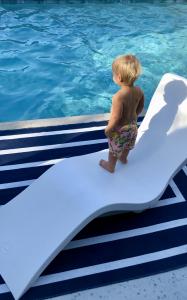Durable Design Gains Momentum as Fast Furniture Falls Out of Favor
From pool loungers to patio sets, long-lasting materials are becoming more popular in outdoor furniture as consumers seek durable alternatives.
Las Olas Luxury Living, a premium outdoor furniture brand, is rising to meet this cultural shift — offering long-lasting, design-forward pool loungers made from rugged materials typically reserved for high-performance gear. Built for sun, water, and time, Las Olas loungers are now part of a growing category of durable outdoor furniture — but with one major difference: they’re actually affordable.
“The loungers I looked at were either cheap or gorgeous but wildly expensive,” said Emily L., a Las Olas customer and mom of two in McKinney, Texas. “Las Olas felt like the first brand that hit the sweet spot — built to last, but not outrageously priced.”
The Middle Ground Between Disposable and Designer
While other durable outdoor brands lean into high-end luxury, Las Olas Luxury Living saw an opportunity to meet everyday consumers in the middle — offering resort-grade quality at a price point that doesn’t require a second mortgage.
Crafted from high-density polyethylene (HDPE) — the same tough material used in hard-sided coolers and kayaks — the loungers are BPA-free and resist UV damage, warping, and cracking over time. The stackable, two-piece design makes for easy storage and less environmental impact in shipping. And the brand’s minimalist packaging skips the foam and plastic clutter in favor of low-waste solutions.
“We’re not the only brand building longer-lasting loungers— but we’re the ones doing it at an accessible price,” said Nikki Nagy, Vice President of Sales and Marketing at Las Olas. “We believe sustainability shouldn’t be a luxury reserved for a few. It should be a smarter, simpler choice available to more people.”
The Cost of Cheap Comfort
The urgency is real: over 9 million tons of outdoor furniture end up in landfills every year, most of it made from flimsy materials that don’t survive more than a season or two. As shoppers grow weary of “fast furniture,” a quiet consumer revolution is happening — one rooted in restraint, not overconsumption.
According to a 2024 Nielsen report, 78% of consumers say they’re willing to pay more for sustainable home goods, but many are now realizing it’s not just about what something is made of, but how long it holds up.
“I used to have to buy new pool furniture every couple of years,” added Emily. “Now I don’t have to worry about it.”
A New Way to Celebrate Earth Day
Las Olas is celebrating Earth Day with limited-time pricing on its pool loungers and newly released outdoor seating and lighting, encouraging more households to invest in durable, low-waste pieces that align with both their style and their values.
While the loungers don’t shout sustainability, they embody it—through thoughtful design, intentional material choices, and a philosophy that honors simplicity and longevity over trend-chasing.
“In a market full of extremes — cheap and wasteful or gorgeous and unattainable — we’re carving out a space for the mindful middle,” said Nagy. “It’s not about having the most expensive patio furniture. It’s about having the last patio furniture you’ll need for a long, long time.”
Explore the Earth Day Collection at lasolasluxuryliving.com.
About Las Olas Luxury Living
Las Olas Luxury Living is a design-driven outdoor furniture and lighting brand on a mission to make sustainable luxury more accessible. With products built to endure and pricing that welcomes everyone, Las Olas Luxury Living is redefining what it means to live consciously and comfortably outside.
Nikki Nagy
Las Olas Luxury Living
+1 469-630-3230
email us here
Visit us on social media:
Facebook
LinkedIn
Instagram
Legal Disclaimer:
EIN Presswire provides this news content "as is" without warranty of any kind. We do not accept any responsibility or liability for the accuracy, content, images, videos, licenses, completeness, legality, or reliability of the information contained in this article. If you have any complaints or copyright issues related to this article, kindly contact the author above.
Made In The USA Announces Top ARTIST Awards, and an Evening TAG Art Auction next weekend
NewSky Security Expands into Cyber Security Private Investigations to Combat Sophisticated Botnet and VPN Threats
CTO G. Vimal Kumar of Cyber Privilege Honored for Advancing Cyber Forensics and Digital Evidence in India
Kalendarium
Więcej ważnych informacji
 Jedynka Newserii
Jedynka Newserii

 Jedynka Newserii
Jedynka Newserii

Prawo

KE proponuje nowy Fundusz Konkurencyjności. Ma pobudzić inwestycje w strategiczne dla Europy technologie
W środę 16 lipca Komisja Europejska przedstawiła projekt budżetu na lata 2028–2034. Jedna z propozycji zakłada utworzenie Europejskiego Funduszu Konkurencyjności o wartości ponad 400 mld euro, który ma pobudzić inwestycje w technologie strategiczne dla jednolitego rynku. Wśród wspieranych obszarów znalazła się obronność i przestrzeń kosmiczna. Na ten cel ma trafić ponad 130 mld euro, pięciokrotnie więcej niż do tej pory.
Firma
Były prezes PGE: OZE potrzebuje wsparcia magazynów energii. To temat traktowany po macoszemu

Choć udział odnawialnych źródeł energii w miksie energetycznym Polski jest stosunkowo wysoki i rośnie, to ten przyrost jest chaotyczny i nierównomiernie rozłożony miedzy technologiami – wskazuje Forum Energii. Dodatkowo OZE potrzebują wsparcia magazynów energii, a zdaniem Wojciecha Dąbrowskiego, prezesa Fundacji SET, ten temat jest traktowany po macoszemu. Brak magazynów powoduje, że produkcja energii z OZE jest tymczasowo wyłączana, co oznacza marnowanie potencjału tych źródeł.
Infrastruktura
Wzrost wynagrodzeń ekip budowlanych najmocniej wpływa na koszty budowy domu. Zainteresowanie inwestorów mimo to nieznacznie wzrasta

Budowa metra kwadratowego domu w Polsce kosztuje od 5,55 do 6 tys. zł w zależności od województwa – wynika z najnowszych analiz firmy Sekocenbud. Najdrożej jest w Warszawie, gdzie cena za metr kwadratowy domu przekroczyła już 6,2 tys. zł. Na przyrosty kosztów budowy domu wpływają zarówno drożejące materiały budowlane, jak i wyższe wynagrodzenia pracowników. Inwestorzy nie rezygnują jednak z budowy domów jednorodzinnych, co ma związek m.in. z wciąż wysokimi cenami mieszkań czy też obniżką stóp procentowych.
Partner serwisu
Szkolenia

Akademia Newserii
Akademia Newserii to projekt, w ramach którego najlepsi polscy dziennikarze biznesowi, giełdowi oraz lifestylowi, a także szkoleniowcy z wieloletnim doświadczeniem dzielą się swoją wiedzą nt. pracy z mediami.









.gif)

 |
| |
| |
|